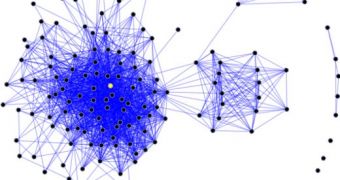Recent investigations into the role that social networks play in our everyday lives show that a lot more things than researchers initially thought are spreading through the connections that keep us together. Investigators have found, for example, that happiness, smiling, loneliness, obesity, and workplace-related problems spread through the networks, but now a new research has demonstrated that cooperation seems to do the same, by up to three degrees of separation. Studying the dynamic of human interactions based on these networks is an emerging field of science, with many researchers taking an active interest in figuring these intricate relationships out.
According to the new results, cooperation between two individuals can help as many as several tens of people to several hundred, depending on the position the original “sources” of the behavior have within the network. The process works relatively simple – one person is kind to another one, and the second returns the favor. This phenomenon is called reciprocity and is one of the foundations of our society, and has been from the get-go. What the researchers found was that, when this behavior appeared, it tended to extend far beyond the first two pairs of individuals, into their social networks.
“For me this is a very romantic paper, because I like the idea that the consequences of my generosity extend far beyond what I can see. One act of kindness can spread to dozens and in some cases hundreds of people we don't know and have never met,” University of California in San Diego (UCSD) expert James Fowler says. He is the author of a new paper detailing the findings, which appears in the March 8 early online issue of the respected journal Proceedings of the National Academy of Sciences (PNAS). Harvard University expert Nicholas Christak has also contributed to the investigation.
“There is a deep and fundamental connection between social networks and goodness. The flow of good and desirable properties like ideas, love and kindness is required for human social networks to endure, and, in turn, networks are required for such properties to spread. Humans form social networks because the benefits of a connected life outweigh the costs,” the Harvard scientist says. Funding for the new research came from the John Templeton Foundation, the Robert Wood Johnson Foundation, and the National Institute on Aging, LiveScience reports.

 14 DAY TRIAL //
14 DAY TRIAL //